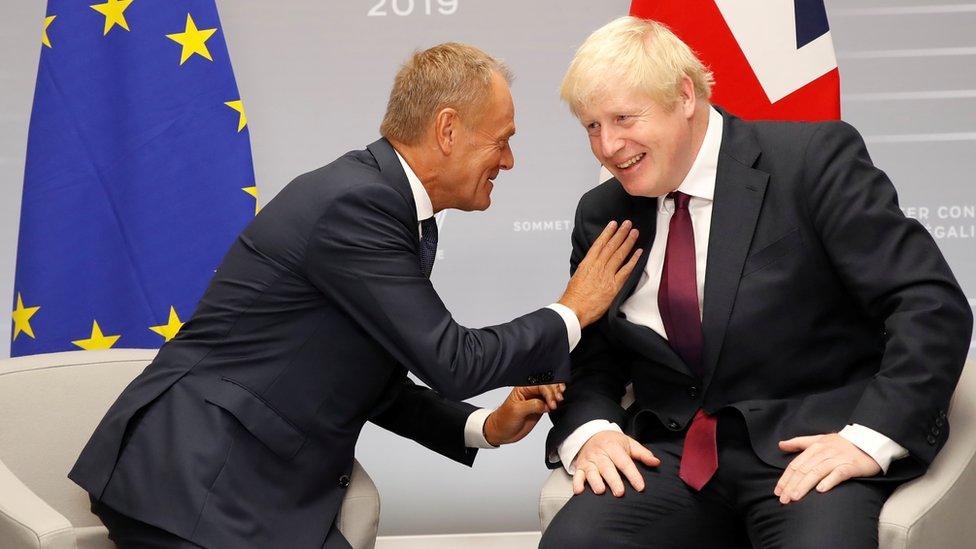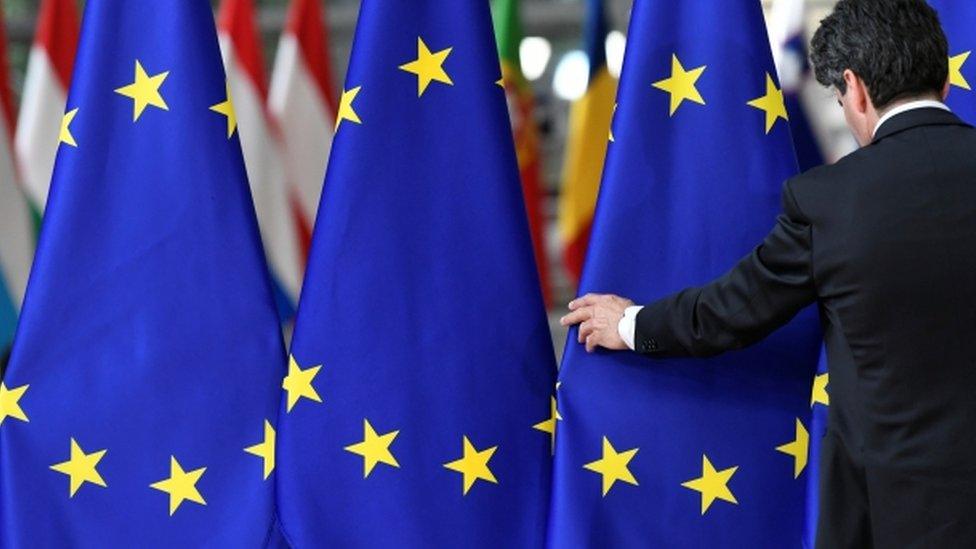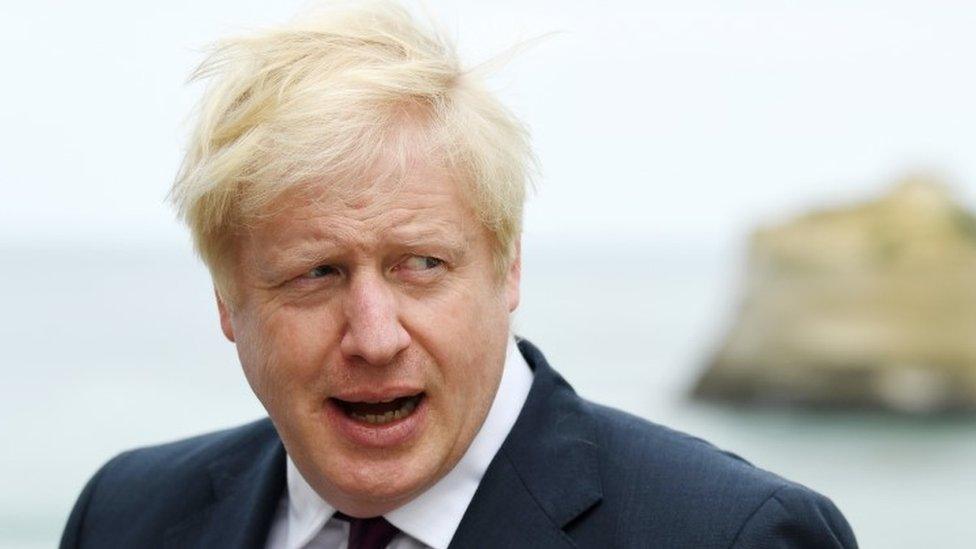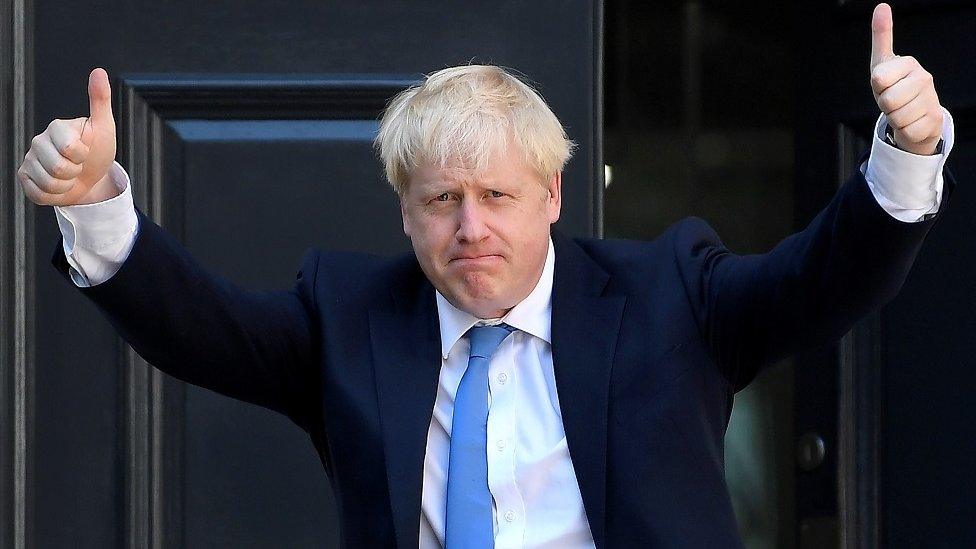Brexit: Is EU softening over Withdrawal Agreement?
- Published
- comments

So many newspaper column inches have been devoted over the last week to a debate over whether or not Boris Johnson has managed to "win a victory" over his EU counterparts, getting them to "budge" over changing the Withdrawal Agreement.
You can in fact argue this both ways.
The "Yes-they've-budged" camp point to German Chancellor Angela Merkel and French President Emmanuel Macron now saying they will consider any new proposals from the UK on replacing the contentious Irish border backstop (if they are realistic and immediately operable).
This is a marked change from the EU's official position when Boris Johnson became UK Prime Minister: that the Brexit Withdrawal Agreement (containing the backstop) was signed, sealed and carved in stone.
The "No-the-EU-hasn't-really-budged" camp say EU leaders don't believe Boris Johnson has any realistic alternatives to the backstop up his sleeve, so they are trying to take the initiative in the blame game that would inevitably follow a no-deal Brexit by wanting to appear open.
The aim being that Angela Merkel, for example, could turn to German businesses that would lose out in a no-deal scenario and say: "Look, I tried my best. It's Boris Johnson who failed you."
EU figures who've been involved in Brexit negotiations are also keen to point out that being open to alternatives to the Irish backstop is not a change of position for Brussels. It's written into the existing Withdrawal Agreement.
Donald Tusk at the G7: I hope Boris Johnson will not want to go down in history as Mr No Deal
And as for Angela Merkel's positive words to Boris Johnson about finding new solutions, the German media was quick to underline how often she has repeated over the last few years that she would work "until the last minute to make a deal with the UK," as long as EU single market rules were respected.
Her attitude - in public at least - is unchanged.
Behind the scenes though, EU leaders have been readjusting their view of Boris Johnson somewhat.
During this summer's Conservative party leadership contest to replace Theresa May as prime minister, I heard Boris Johnson described in private conversations in EU circles as "a buffoon" and "a reckless populist willing to drive his country over the cliff-edge of a no-deal Brexit to satisfy his ambition to become prime minister".

I now notice a subtle tone change. In his one-to-one chats in Paris, Berlin and at the G7 with European Council President Donald Tusk, the prime minister has managed to persuade Brussels that:
a) He is serious in his threat to pursue a no-deal Brexit if no agreement with the EU can be found;
and b) He would actively prefer to get a deal through parliament if possible.
But this change in perception does not alter facts on the ground.
EU leaders still think a no-deal Brexit is the most likely option right now.
What is the customs union? Reality Check unpacks the basics.
Time is running out - unless the prime minister were to do a last-minute U-turn and request a new Brexit extension after all.
EU politicians also speak of the numbers not adding up in parliament for Boris Johnson. A reason they give for not being willing to jump forward with a backstop compromise.
"There is little-to-no pressure from the rest of us in the EU on Dublin right now to find and accept a backstop compromise," one high-level EU diplomat told me.
"If we did introduce a time limit - or even if we got rid of the backstop altogether from the Withdrawal Agreement, as Boris Johnson says he wants us to do - what would be the point? The prime minister doesn't have the majority in parliament to guarantee the Brexit deal would then go through and we, the EU, would have sacrificed our principles, our reputation, exposed our single market on the island of Ireland and thrown member state Dublin under a bus voluntarily. We'd be worse off than if we just accept a no-deal Brexit is going to happen."
Boris Johnson's majority of one in parliament means EU leaders understand his focus is now domestic: shoring up his premiership by winning a general election, rather than agreeing a compromise deal with the EU.
Few in the EU are holding their breath that MPs will succeed in stopping a no-deal Brexit in the coming weeks - though if they did, Brussels would be delighted.
I notice rather that a number of European politicians are placing any hopes they have on Boris Johnson to avoid no deal. They speak of the prime minister's ambition to remain in the job and to go down in the history books in a positive way.
One European official remarked: "Johnson can see a no-deal Brexit is bad for his country but we're afraid he's boxed himself in with all his threats and promises at home."
EU leaders will now watch and wait for what early autumn brings in UK politics. The next scene in this Brexit drama will play out in Westminster, not Brussels.
- Published25 August 2019

- Published26 June 2019
- Published23 July 2019

